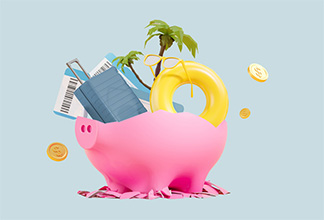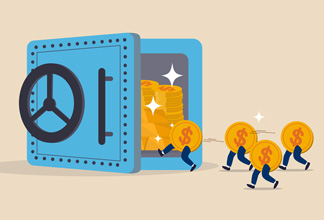Burnout Isn't Inevitable. Here are 5 Habits That Can Help You Avoid It.
Written by Sarah Treleaven | Published on July 19, 2021
Written by Sarah Treleaven | Published on July 19, 2021
More than a full year into a global pandemic, chatter around the virtual water cooler has shifted to a possible return to the office and the wave of employee resignations predicted to hit after the pandemic lifts. But for many workers dreading yet another video call, juggling the demands of parenting and working at home, or simply feeling like they can't keep up, these conversations are rooted in an all-too-familiar theme: burnout.
Feeling like you're barely treading water is an early warning sign—and one that can have an impact on every aspect of your life, from making it into the shower every morning to making the right investment decisions for you. But while the ramifications of burnout are often personal, its causes tend to lie in our professional lives.
Dr. Marie Åsberg, psychiatrist and expert in exhaustion at Stockholm's Karolinska Institutet, has described the phenomenon as "hitting the wall." In 2019, the World Health Organization defined burnout as an occupational phenomenon and identified three key dimensions to the problem:
Feelings of energy depletion or exhaustion
Increased mental distance from one's job, or feelings of negativism or cynicism related to one's job
Reduced professional efficiency
That same year, a survey by staffing firm Accountemps showed that approximately 95 per cent of Canadian workers reported feeling at least somewhat burned out. (And that was before a global pandemic.) So, what do you do if you feel like whatever you're doing is never enough? Here are five traits of people who have burnout under control.
They sleep well
For many of us, this is easier said than done. But getting sufficient sleep is crucial to almost everything else we do — and it's one of the best ways to reduce the likelihood of burnout. One study published in the Journal of Occupational Health Psychology found that too little sleep was a main predictor of burnout. You can consider taking steps to reinforce proper sleep hygiene: Keep your laptop out of the bedroom, try a white-noise app or weighted blanket — do whatever you need to get the rest you need.
They create rituals that separate work from home
With many people now working from home, the boundaries between employees' personal and professional lives can seem blurred — which can leave them short on time to rest and recharge. Oft-cited research from Arizona State University recommends rites of passage to help segment your days. Perhaps think of that in manageable, achievable terms: for example, marking the end of the workday by taking a walk in a nearby park, or indulging in a relaxing bath — or something as simple as starting dinner. The more enjoyable the ritual, the easier you may find it to exit "office mode."
They take back control with self-talk
Feeling overwhelmed and anxious can be heightened by feeling a lack of recognition. For remote workers in particular, it's easy to feel invisible, dissatisfied or undervalued right now as video calls take the place of in-person social contact. That lack of recognition can kick off a devastating spiral of negative self-talk, which only makes a bad situation worse.
The trick is changing the narrative in your head. According to author and anxiety expert Alice Boyes, mastering self-talk can help you feel both calmer and more in control. Here are two mantras she recommends:
- "Even though I have many things to do, I can only focus on the one thing I'm doing right now. I'll feel better if I do that."
- "What's the best action to take right now?"
Both mantras encourage the acceptance of limits and the prioritization of tasks that provide a sense of progress. (Find more ways to prompt positivity in The Magic of Self-Talk: You Know More Than You Think.)
They talk it out
Many people on the verge of burnout suffer in silence, reluctant to divulge just how much they're struggling to those around them — often as a result of feelings of shame, anxiety or hopelessness. But experts agree that it's essential to ask for help before it's too late. Reaching out rather than internalizing is important; our present social disconnection can serve to exacerbate existing problems. Ask those around you to help you come up with a better plan, and consider seeking out professional advice—particularly if you're feeling acutely overwhelmed. You might need to be open to tweaking things in both your personal and professional life.
They keep things in perspective
As Margaret M. Luciano and Joan F. Brett, professors at Arizona State University, write, "most solutions to burnout aren't one-size-fits-all." So give your family, friends and colleagues the chance to show that they care about your well-being.
Remember: It's not you — it's everything. When it comes to burnout, it can be helpful to think of the problem holistically. Burnout is rarely just about you; it's about a confluence of factors in need of adjustment.
RBC Direct Investing Inc. and Royal Bank of Canada are separate corporate entities which are affiliated. RBC Direct Investing Inc. is a wholly owned subsidiary of Royal Bank of Canada and is a Member of the Investment Industry Regulatory Organization of Canada and the Canadian Investor Protection Fund. Royal Bank of Canada and certain of its issuers are related to RBC Direct Investing Inc. RBC Direct Investing Inc. does not provide investment advice or recommendations regarding the purchase or sale of any securities. Investors are responsible for their own investment decisions. RBC Direct Investing is a business name used by RBC Direct Investing Inc. ® / ™ Trademark(s) of Royal Bank of Canada. RBC and Royal Bank are registered trademarks of Royal Bank of Canada. Used under licence.
© Royal Bank of Canada 2021.
The views and opinions expressed in this publication are for your general interest and do not necessarily reflect the views and opinions of RBC Direct Investing. Furthermore, the products, services and securities referred to in this publication are only available in Canada and other jurisdictions where they may be legally offered for sale. If you are not currently resident of Canada, you should not access the information available on the RBC Direct Investing website.

We look at the cost of getting away, and whether your money could be better invested for the future

Here are some of our top content recommendations for investors

What you should know before buying into a dividend-paying business